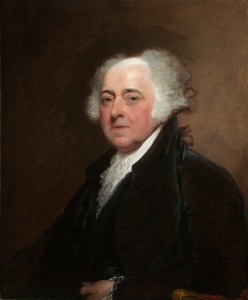John Adams Unbound
Listen to the Recess! Clip
| Author | John Cech |
| Air Date | 11/6/2006 |

John Adams Unbound Transcript
One of our nation’s Founding Fathers, Adams was the son of a colonial farmer who instilled in his son not only the values of hard work and frugality but also the singular importance of education. As a boy, Adams was sent to small country schools in the village of Braintree, just south of Boston, and then, at 15, to Harvard, the only college nearby. When he took up his studies there, Adams could read Latin, and he practiced reciting Cicero’s orations aloud because, he wrote, “it exercises my lungs, raises my Spirits, opens my Pores, quickens the Circulation, and so contributes much to Health.”
Adams didn’t just like books, he was passionate about them and spent a considerable amount of whatever he earned in his life on the more than 3,000 volumes in his library. He never became a wealthy man, though he was a brilliant lawyer and could have made a tidy fortune in private practice. He’d earned early fame for his principled legal defense of the British soldiers who had fired on a crowd of stick- and snowball-throwing colonists, triggering what would be called the Boston Massacre. Though Adams’ sympathies were with the cause of Revolution, he nevertheless believed that the soldiers were entitled to a fair trial. And his defense was so compelling that the soldiers were acquitted. Adams later wrote this was “one of the best Pieces of Service I ever rendered my Country.”
Adams’ love of books was transmitted to his and Abigail Adams’ four children. The children asked their mother to tell their father to bring them back books as presents from his frequent travels. And some volumes, like Adams’ small set of Shakespeare’s works, were passed down from child to grandchild in the Adams family. Adams told his son, John Quincy Adams, to always keep some poetry close by: “You will never be alone with a poet in your pocket. You will never have an idle hour.” When father and son were travelling abroad in 1778 and 1779, Adams took over the duties of tutoring his son, and they would read aloud over breakfast from the works of the ancient Roman historian and biographer, Plutarch. In this same, thick volume of Plutarch, the Adams children pressed leaves from the trees of New England — poplars, maples, oaks — which came fluttering out from the book’s pages when the exhibition was being prepared. These leaves are in the show, too. The fragile reminders of their lives, that moment in history, and the power of words and of books.